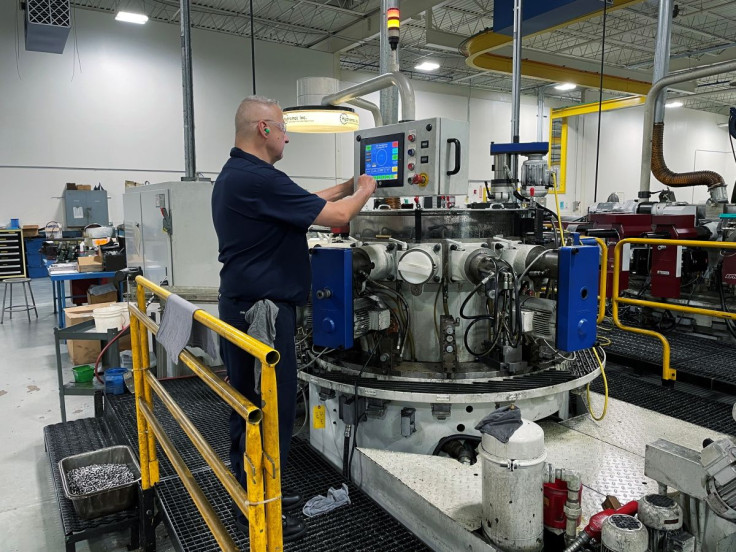New Wave Of Inflation - And Disruptions - Hits U.S. Factory Floors

Surging inflation is disrupting everything from carpools to the ability to quote prices on new business at already-strained U.S. factories.
At BCI Solutions Inc., a metal foundry in Bremen, Indiana, 14 workers quit in the last two weeks - over 7% of its total workforce and an unprecedented number compared with pre-pandemic times. BCI has long struggled to hold workers but never lost that many in such a short span.
Company chief executive officer J.B. Brown blames at least part of the sudden loss of workers on the spike in gasoline prices in the wake of Russia's invasion of Ukraine, which has roiled global energy markets and sent prices at the pump through the roof. Regular unleaded gas was a record $4.33 a gallon on Friday, according to AAA, up 85 cents in a month.
"When gas goes up, people want to work closer to home," he said, and with the jobless rate in the surrounding largely rural Marshall County under 1%, according to Bureau of Labor Statistics data, those jobs are easy to find. In some cases, he knows workers who don't want to quit - but do so because the person they carpool with does.
The current wave of disruptions come as many manufacturers felt they were starting to untangle supply chain and labor problems created by the COVID-19 pandemic. Backlogs at major U.S. ports have declined in recent weeks, for instance.
And it remains too early to fully assess how much the crisis in Ukraine will slow a return to normal operations - or create new issues.
Federal Reserve Chair Jerome Powell has said the central bank would start "carefully" hiking interest rates at its upcoming March meeting as it balances the threat of high inflation and complex new risks posed by the war in Europe. He has also said, however, that the Fed would be ready to move more aggressively if inflation does not cool as quickly as expected.
Powell called the Russian invasion "a game changer" that could have unpredictable consequences.
NO PIG IRON
Some of those hard-to-predict things have already hit factory floors. At Gent Machine Co., in Cleveland, that includes disrupting work on a bid for new business.
Rich Gent, who runs the 50-employee company with his brother, said he has been working for five months with a customer who wants his factory to start producing a stainless steel part for its marine products. Stainless prices, as with most metals, shot up during the pandemic and supplies remain tight.
Earlier this week, when Gent called around to his five metal suppliers, none could give him a price estimate for the 5,000 pounds a month he needs. Production of stainless requires nickel, and with Russia a major nickel producer, prices have surged.
Two suppliers said they could only start shipping in two months and the price would be the spot price on shipping day. The others couldn't even commit to supplying metal. "Their best guess was they could get me the material in November," he said.
Austin Ramirez, chief executive of Husco International Inc, said the crisis is also driving home just how intertwined global supply chains remain and the unpredictable fallout that can create. Waukesha, Wisconsin-based Husco makes auto and off-road machinery parts and has no business associated with Russia or Ukraine.
"But Ukraine supplies pig iron to Europe, and we buy from foundries that are now facing a shortage of pig iron," he said.
They also rely on parts that were formerly transported from China to Europe through both countries. "My biggest concern now is that the confluence of Ukraine and the semiconductor shortages and everything else in global logistics will become a demand constraint," he said. While business remains strong, more customers are canceling orders because they can't get parts from other suppliers.
"So we go through all this work and expense to expedite material only to have orders drop out at the last minute because they can't get other parts to make the car or the excavator or whatever it is," said Ramirez.
For the first time since before the pandemic, he said he's started to worry about the economy dropping into a recession. "Earlier this year, it felt like things were getting a little better - now, it feels like wind is blowing in our face again."
© Copyright Thomson Reuters 2024. All rights reserved.




















